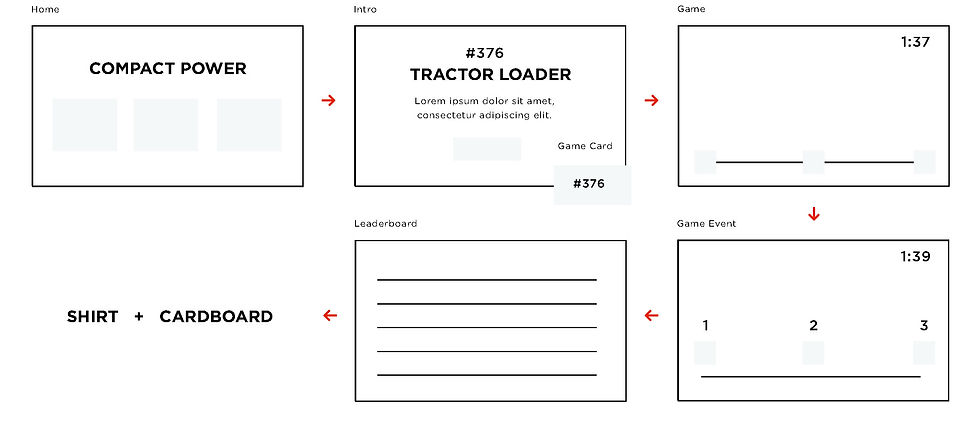Compact Power VR
CARDBOARD VR APP
Compact Power Equipment is a fast-growing, innovative leader in the rental and services of commercial and light construction equipment industries. The company engaged Brunner with the opportunity of producing an interactive virtual reality component for an annual event at the Home Depot headquarters.
I have omitted and obscured confidential information in this case study. The information in this case study is my own and does not necessarily reflect the views of the client.

The goal of the project was to strengthen attention and engagement towards Compact Power’s section at Home Depot’s Annual Tool Rental Center Day event. In previous years their attractions were exceedingly popular, but this year they aspired a new form of technology, something exciting and interactive that would entice attendees’ interests.
The Solution
After several brainstorming and whiteboard sessions, we came up with the idea of creating a game-like experience utilizing 360 4K captured video segmented out by quick time events permitting users to finish certain tasks related to selected Compact Power equipment.
Using our Samsung Gear omnidirectional camera, 360 recordings would be seamlessly captured allowing the user to feel as if they are operating the vehicle. Complete the quick time events as fast as possible, utilizing mobile VR gaze control, to land a spot on the leaderboard to compete and earn prizes.
In video games, a quick time event (QTE) is a method of context-sensitive gameplay in which the player performs actions on the control device shortly after the appearance of an on-screen instruction/prompt. It allows for limited control of the game character during cut scenes or cinematic sequences in the game.

The Problem
My Role
I was responsible for experience strategy, UX, UI design, and environment build implementation within the Unity gaming engine integrating the Google Cardboard SDK. I produced all major deliverables; art directed and operated the equipment during the shoot, in addition to conducting presentations and direct communications with the client. Throughout the project I worked closely alongside my development partner during all phases to insure we produced the best quality, and yet simple cutting-edge experience for ourselves, and the Compact Power team.
Challenges
The greatest challenge was forming direct communication between five mobile devices running our VR application and the SQL Database hosting the leaderboard running on a separate machine, for this is something we’ve never attempted. With that aside, incorporating a personalized experience while pulling live data from these devices was a new undertaking as well.
The project timeline was strict. With the combination of research, UX, design, directing the video shoot, implementation, development, QA and testing, we had to nail the experience and work efficiently.
Approach
Working alongside project management and the account team, we decided to split timelines into parallel working paths. This allowed us to focus primarily on the main experience, design and usability while simultaneously implementing game development and internal testing for quality assurance for both Android and iOS.

Wireframes
Seeing we were on a tight schedule we needed to move quickly and efficiently throughout the research and UX phase. To accomplish this I began with simple whiteboard and sketches of the game and UI that where then presented internally. Working closely in collaboration with my developer partner we avoided any technical roadblocks that may arise.
Once approved, detailed wireframes were designed, executed into a more comprehensive document and presented.


Video
Working with Compact Power we had the opportunity to rent and operate three of their most popular machines, the Skid Steer, Mini-Excavator, and Aerial Lift. After learning how to control and maneuver these powerful machines, we mounted our Samsung Gear omnidirectional camera inside the driver seats capturing seamless 4K 360 footage of each vehicle completing their assigned task, building a complete immersive experience for the user.
The Game
The game concept had to be a quick, yet simple competitive experience. For attendees at the event might not spend a considerable amount of time at our section.
Players who initially picked up the Google Cardboard were asked their name followed by a menu requesting to choose one of three vehicle types. The Mini Excavator was tasked to dig, Skid Steer tasked to move heavy logs, and a 50ft Aerial Lift tasked to trim tree branches. After a scenario was selected, attendees instantaneously found themselves fully immersed and operating the vehicle of choice in virtual reality within Google Cardboard.

Their main goal was to complete each task as fast as possible by completing three instances of capturing color-coated medallions within a particular order. Utilizing quick time events and gaze control, attendees not only played the game once, but found themselves eager to compete all three.

Immediately following a completed scenario, the app sent a signal to our custom SQL Database that instantly displayed the attendee’s name and completion time onto the leaderboard for individual bragging rights and prize winning opportunities.

The Result
The response was phenomenal. In preceding years, Compact Power’s segment was remarkably popular, but this year it was different, they had Virtual Reality. The game quickly became the talk of the event, for some heard of VR but never experienced it. The client was overwhelmingly excited from the outcome and thanked us immensely for making their section the talk of this year’s Home Depot Annual Tool Rental Center Day event.
